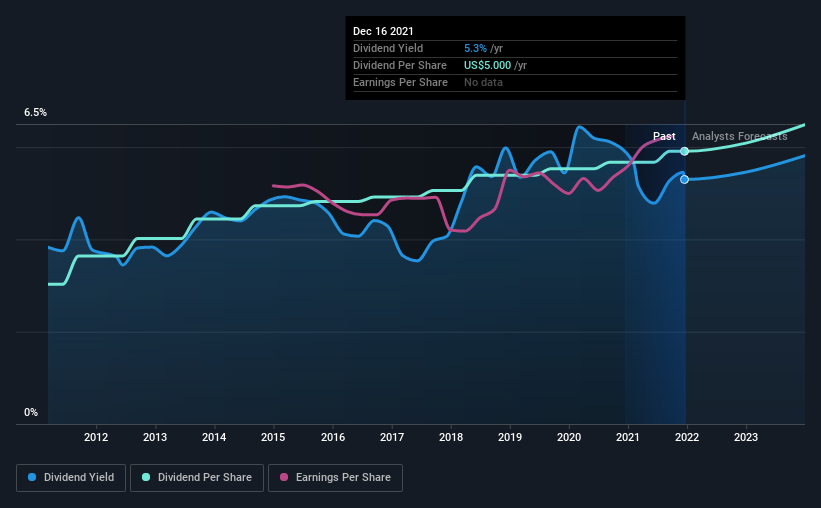Is It Worth Considering Philip Morris International Inc. (NYSE:PM) For Its Upcoming Dividend?
Philip Morris International Inc. (NYSE:PM) is about to trade ex-dividend in the next four days. The ex-dividend date is one business day before a company's record date, which is the date on which the company determines which shareholders are entitled to receive a dividend. The ex-dividend date is important because any transaction on a stock needs to have been settled before the record date in order to be eligible for a dividend. Therefore, if you purchase Philip Morris International's shares on or after the 22nd of December, you won't be eligible to receive the dividend, when it is paid on the 10th of January.
The company's next dividend payment will be US$1.25 per share, and in the last 12 months, the company paid a total of US$5.00 per share. Last year's total dividend payments show that Philip Morris International has a trailing yield of 5.3% on the current share price of $94.38. If you buy this business for its dividend, you should have an idea of whether Philip Morris International's dividend is reliable and sustainable. So we need to check whether the dividend payments are covered, and if earnings are growing.
See our latest analysis for Philip Morris International
If a company pays out more in dividends than it earned, then the dividend might become unsustainable - hardly an ideal situation. Its dividend payout ratio is 84% of profit, which means the company is paying out a majority of its earnings. The relatively limited profit reinvestment could slow the rate of future earnings growth. We'd be concerned if earnings began to decline. Yet cash flows are even more important than profits for assessing a dividend, so we need to see if the company generated enough cash to pay its distribution. It paid out more than half (72%) of its free cash flow in the past year, which is within an average range for most companies.
It's positive to see that Philip Morris International's dividend is covered by both profits and cash flow, since this is generally a sign that the dividend is sustainable, and a lower payout ratio usually suggests a greater margin of safety before the dividend gets cut.
Click here to see the company's payout ratio, plus analyst estimates of its future dividends.
Have Earnings And Dividends Been Growing?
Stocks in companies that generate sustainable earnings growth often make the best dividend prospects, as it is easier to lift the dividend when earnings are rising. If earnings decline and the company is forced to cut its dividend, investors could watch the value of their investment go up in smoke. With that in mind, we're encouraged by the steady growth at Philip Morris International, with earnings per share up 5.4% on average over the last five years. Decent historical earnings per share growth suggests Philip Morris International has been effectively growing value for shareholders. However, it's now paying out more than half its earnings as dividends. Therefore it's unlikely that the company will be able to reinvest heavily in its business, which could presage slower growth in the future.
Many investors will assess a company's dividend performance by evaluating how much the dividend payments have changed over time. In the last 10 years, Philip Morris International has lifted its dividend by approximately 6.9% a year on average. It's encouraging to see the company lifting dividends while earnings are growing, suggesting at least some corporate interest in rewarding shareholders.
The Bottom Line
From a dividend perspective, should investors buy or avoid Philip Morris International? Earnings per share have been growing modestly and Philip Morris International paid out a bit over half of its earnings and free cash flow last year. Overall we're not hugely bearish on the stock, but there are likely better dividend investments out there.
If you're not too concerned about Philip Morris International's ability to pay dividends, you should still be mindful of some of the other risks that this business faces. Every company has risks, and we've spotted 1 warning sign for Philip Morris International you should know about.
We wouldn't recommend just buying the first dividend stock you see, though. Here's a list of interesting dividend stocks with a greater than 2% yield and an upcoming dividend.
Have feedback on this article? Concerned about the content? Get in touch with us directly. Alternatively, email editorial-team (at) simplywallst.com.
This article by Simply Wall St is general in nature. We provide commentary based on historical data and analyst forecasts only using an unbiased methodology and our articles are not intended to be financial advice. It does not constitute a recommendation to buy or sell any stock, and does not take account of your objectives, or your financial situation. We aim to bring you long-term focused analysis driven by fundamental data. Note that our analysis may not factor in the latest price-sensitive company announcements or qualitative material. Simply Wall St has no position in any stocks mentioned.

